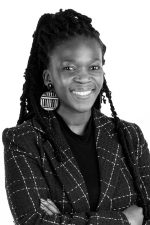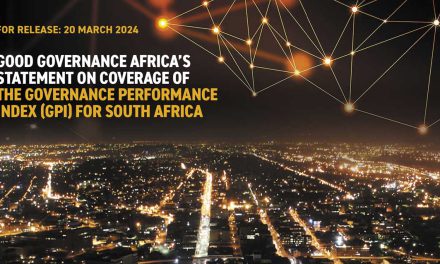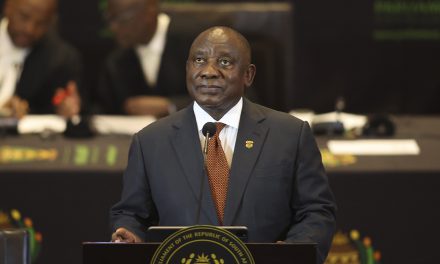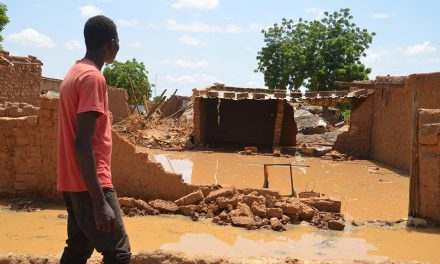Almost a third of African countries have already held, or will still hold, general or presidential elections in 2024. A significant concentration of these are in the Southern African Development Community (SADC) region, including South Africa, Botswana, Mozambique, and Namibia.
This election calendar signifies the deepening and maturing of Africa’s democratic process. Citizens across the continent are showing a preference for a consolidated democracy — one in which the supply of democratic governance meets or even exceeds the demand. About 45% of Africans perceive their countries as “mostly” or “completely” democratic, yet only 37% are satisfied with how democracy functions in their country.
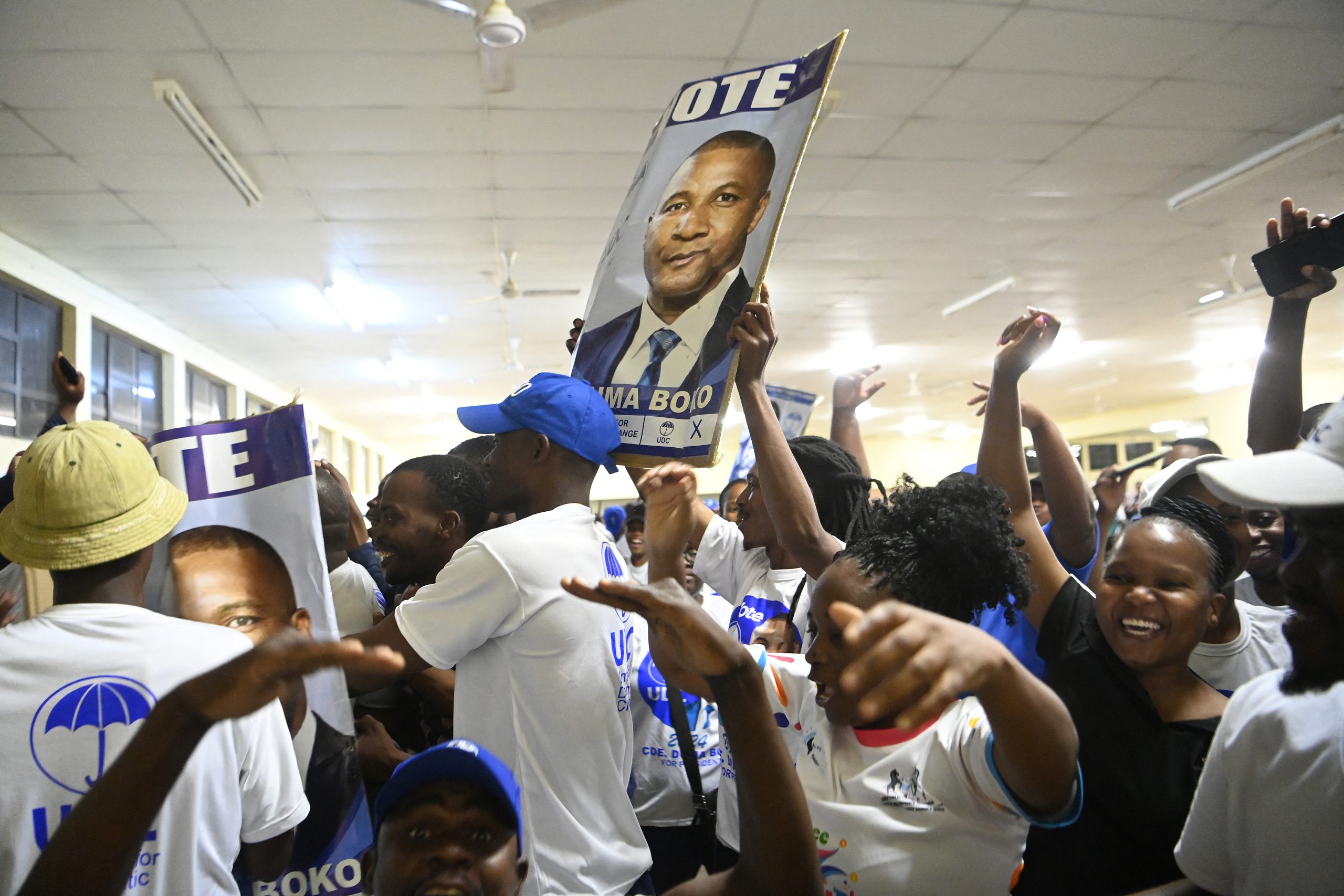
Umbrella for Democratic Change (UDC) supporters at a counting centre in Gaborone on 31 October 2024. Botswana President Mokgweetsi Masisi’s party suffered a resounding defeat in the general elections, losing its nearly six-decade grip on power.
Photo by Monirul Bhuiyan / AFP
Elections that fail to reflect citizens’ voices or are not conducted in a free and fair manner risk undermining citizens’ commitment to democracy or heightening their demands for it.
African citizens remain firmly committed to democratic values: 66% support democracy, 80% reject one-person rule, 78% reject one-party rule and 66% reject military rule.
While elections remain the preferred method for selecting leaders, recent data shows a drop in support for elections by 8 percentage points across 30 African countries. This trend signals a potential challenge, as election quality has varied across the continent.
The role of regional bodies like SADC is crucial in ensuring electoral standards, as the credibility and conduct of these elections reflect on the success — or failure — of these organisations to uphold democratic principles.
SADC’s role and limitations in ensuring democratic integrity
SADC, with eight of its 16 member states holding elections this year, has a mandate to promote best democratic practices within its region. However, while it has developed institutional frameworks like the Principles and Guidelines Governing Democratic Elections, it often struggles with limited capacity to address political crises that emerge from contested elections or suspected election rigging, as seen in Zimbabwe, especially in 2023. This limitation can erode SADC’s credibility in the eyes of African citizens and affect democratic stability in the region.
Southern Africa has historically been considered relatively politically stable, with the last civil war ending in 2002 in Angola. Yet, recent elections, like Mozambique’s, highlight the need for SADC to uphold rigorous democratic standards.
The 9 October Mozambican elections were relatively peaceful. However, following the announcement of preliminary results favouring the ruling Frelimo party under Daniel Chapo, the opposition rejected these results, leading to protests.
Tragically, this post-election violence has resulted in at least two deaths so far. Elvino Dias, working for presidential candidate Venâncio Mondlane, and Paulo Guambe, working for opposition Partido Otimista pelo Desenvolvimento de Moçambique, were both reportedly killed in the northern city of Nampula. Notably, the African Union and EU promptly condemned the violence, whereas SADC has remained silent.
Challenges in SADC’s election observation efforts
SADC’s election observation in Mozambique was limited, with only 53 observers monitoring 288 of the 25 000 polling stations (just over 1%). In contrast, the EU’s mission observed voter registration, campaigning, voting and counting across 729 polling stations. SADC’s limited coverage raises questions about its commitment to democratic oversight and its ability to provide an accurate assessment.
Concerns about impartiality and credibility within SADC’s mission arise, particularly given its leadership under Amani Karume, Zanzibar’s former president, whose administration faced similar accusations of electoral misconduct. The SADC electoral observation mission’s preliminary declaration highlights no major issues in the Mozambican elections. It also doesn’t note whether Mozambique adhered to the orgainisation’s election guidelines and principles. Once again, this raises questions about its credibility and integrity.
This is concerning, especially given that the final SADC report on the 2023 Zimbabwean elections was clear and specific about its problems. However, its recommendation that the opposition approach the constitutional court was untenable because of the alleged co-optation of the judiciary by the ruling incumbent.
SADC’s limited capacity and complex decision-making processes further hinder its ability to intervene effectively. Intervention requires consensus among member states, many of whom are reluctant to allow external influence over domestic affairs. This unwillingness to cede even minimal sovereignty prevents SADC from addressing conflicts decisively, limiting its effectiveness in maintaining political stability during crises.
For example, in cases of alleged vote rigging or electoral violence, SADC’s ability to act often relies on soft diplomacy rather than concrete sanctions or decisive conflict resolution mechanisms. The body’s reliance on diplomatic engagement might not always be sufficient to manage crises and could signal to member states that breaches in democratic standards carry minimal consequences.
Although its Principles and Guidelines Governing Democratic Elections outlines steps SADC can take — such as publishing reports and engaging diplomatically — proactive measures have been sparse, as seen in Mozambique.
Moreover, resistance from member states to external monitoring or intervention stymies SADC’s potential to enforce democratic norms effectively. This sovereignty-first mentality often creates barriers to cooperation and limits the organisation’s strength, as SADC’s interventions depend on the very members it is supposed to hold accountable. This presents a cyclical problem where lack of accountability weakens unity, and lack of unity prevents accountability.
Is SADC waning?
Over the years, SADC’s ability to enforce democratic principles and maintain stability and security has faced scrutiny. Even the withdrawal of its troops earlier this year from extremist-ravaged northern Mozambique increased instability in the region.
Recent reports of suspected interference by Zimbabwe’s Zanu-PF in other SADC countries add a new layer of concern. Former Botswana president Ian Khama has warned opposition parties about alleged interference by Zanu-PF, including suspicions of vote rigging in Botswana’s elections on 30 October 2024, alongside reports of Zimbabwean nationals voting in Mozambique’s recent election, revealing a concerning trend that raises questions about the integrity of regional processes.
Such actions erode trust among member states and deepen divisions across the region, potentially weakening SADC’s authority as a democratic standard bearer. If these trends continue, its capacity to serve as a stabilising force could be undermined, affecting regional cohesion, democratic progress and, ultimately, political stability.
The implications of SADC’s challenges extend beyond political elites to citizens who feel increasingly disconnected from regional governance structures. If SADC fails to address concerns around electoral interference, and to respond decisively to breaches in democratic standards, mistrust among citizens will grow, deepening divisions within and between member states.
These sentiments could intensify anti-regionalist attitudes, undermining SADC’s founding principles and creating friction among citizens of different countries. In addition, its weakened credibility risks alienating the region’s youth, who might feel that regional governance bodies do not represent their interests or prioritise democratic reforms.
Moving forward: Strengthening SADC’s role in regional democracy
SADC’s future as a stabilising force in Southern Africa hinges on its ability to evolve in its response to these challenges. The body must adopt a proactive stance, bolstering its monitoring capacities and enforcing higher standards of democratic integrity.
Investment in robust electoral observation, combined with transparent post-election reporting, could enhance its credibility. Moreover, encouraging dialogue about sovereignty and regional co-operation among member states could foster a more unified approach to democratic governance. If SADC can assert itself as an impartial and committed actor in regional politics, it stands a chance of regaining trust and strengthening political stability in Southern Africa.
To deepen democracy’s roots, SADC must also focus on enhancing youth participation, encouraging meaningful civic engagement and fostering a culture of accountability among its leaders.
Moreover, the persistent mistrust between SADC member states suggests a waning sense of unity and members might increasingly look beyond SADC for crisis resolution. As democratic processes mature, it must prioritise reinforcing its credibility, impartiality and oversight mechanisms to avoid becoming a secondary option.
This article first appeared in Mail & Guardian.
MmabathoMongaeis a Data Analyst within the Governance Insights & AnalyticsProgramme. She is a PhD candidate in International Relations at the University of the Witwatersrand, and her thesis research focuses on how governance quality influences popular support for and satisfaction with democracy in Africa. While completing her PhD, Mmabatho worked as Sessional lecturer in the International Relations Department at the University of the Witwatersrand and as a research fellow at the Centre for Africa-China Studies (CACS) at the University of Johannesburg. Her research interests include democracy, governance, Africa’s political economy, and quantitative social analysis. Mmabatho has published research for Routledge, EISA, and The Thinker.

